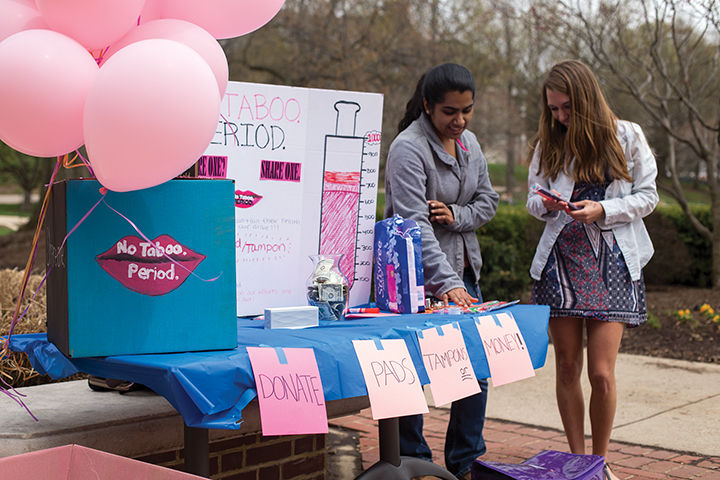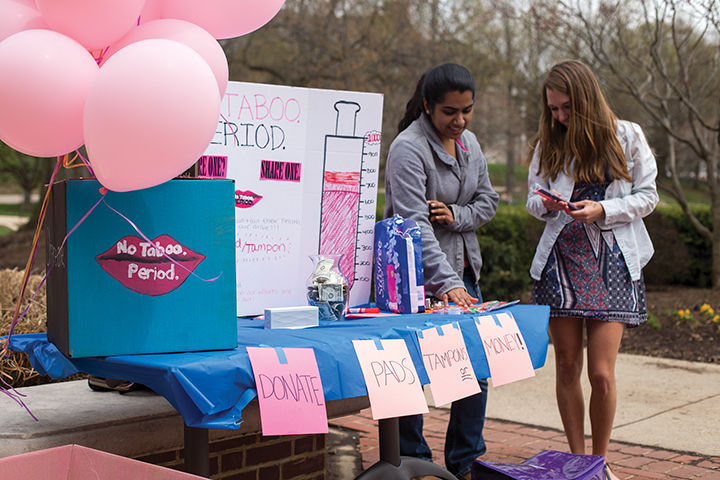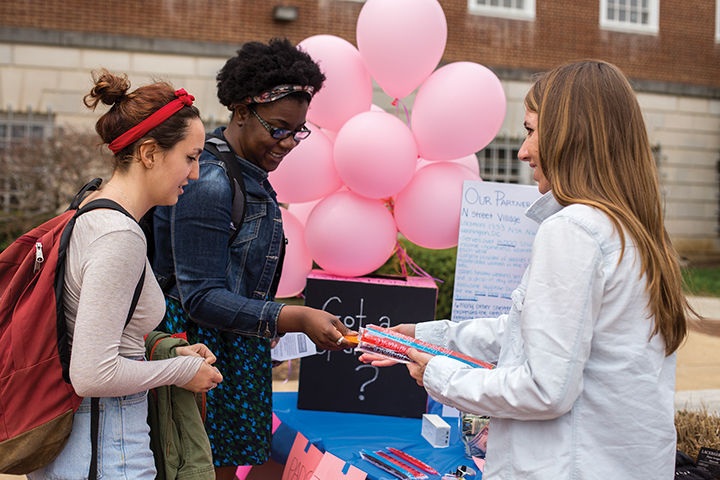For five undergraduate women, talking openly about pads and tampons is no cause for shame. The words merely represent items all women need. Period.
Working to reverse the stigma surrounding feminine hygiene products while also helping the local homeless community, the Do Good Challenge group No Taboo. Period. has collected more than 2,700 pads and tampons and about $300 for a women’s shelter in Washington.
“When you ask people, ‘What do you normally donate to the homeless?’ how many times have you heard them say pads and tampons?” said team member Urooj Fatima. “When you realize the severity of the situation, it’s actually so important.”
The women collected products and money outside McKeldin Library Wednesday for the largest event of their campaign, which began in mid-March. They more than doubled the donations they received from previous presentations and bins around the campus.
On Monday, the No Taboo. Period. group made it to the semifinals of the fourth annual Do Good Challenge, an eight-week competition among 69 teams that’s aimed at encouraging students to participate in philanthropy.
They will present their latest successes and plans Thursday, in the hopes of becoming one of the top three teams in the final competition April 28. The first-place winners will receive $5,000 for their chosen cause.
Senior Megan Hadley said she came up with the idea to donate pads and tampons to a local shelter after reading about the issue and when she volunteered at Washington’s N Street Village.
N Street Village is a community for homeless and low-income women that provides a range of services including housing, hot meals, health care and necessary feminine products, said Megan McKinley, the group’s donor relations manager.
“When you’re a regular girl having your period, there are things you need,” McKinley said. “When you’re homeless, that doesn’t change. These products are very important to help women with basic needs as well as self-respect.”
Hadley, a physiology and neurobiology major, said pads and tampons are not only necessary, but they are vital to a woman’s health. Not having access to feminine products, or using one for too long, can be detrimental, she said.
“The health risks are kidney infections, urinary tract infections, toxic shock syndrome, which can lead to death,” said Hadley, the No Taboo. Period. team leader. “I don’t think people are aware.”
Initially, the team of women set out to collect 500 products, but they quickly reached that goal and extended to 1,000 — which their event Wednesday helped them surpass.
While the women said they were met overwhelmingly with positive reactions to their project, they did struggle to reach the male population, Fatima said. By collecting money, not just products, the team gave men a better chance to donate to the cause.
“All the males we talked to, they definitely thought it was a problem that seemed important, but they just had never thought about it,” said Fatima, a sophomore community health major.
And engaging students in conversation is the best way to take away the stigma surrounding the subject, said Nicole Lang, a member of No Taboo. Period.
One product costs about 25 cents, Lang said. The group will continue collecting products and money through May, and at the end of the collection process, they will visit N Street Village to make their final donation.
“It’s one thing to raise money,” said Lang, a senior criminology and criminal justice and psychology major, “but it’s another to really interact with people and meet them on a personal level and see who you are truly impacting.”
Sophomore cell biology major Dharani Krishnamoorthi and senior criminal justice and psychology major Nicole Lang collect tampons and donations in front of McKeldin Library to distribute to homeless women in DC as part of their “No Taboo. Period.” campaign.
Senior criminal justice and psychology major Nicole Lang hands ice pops to sophomore english major Hanna Greenblott (left) and sophomore multiplatform journalism major Rosie Brown (second from left) after they make a donation to the “No Taboo. Period.” campaign, which raises awareness and sanitary supplies for homeless women in DC.





